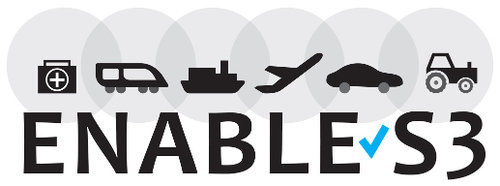ENABLE-S3 European Initiative to Enable Validation for Highly Automated Safe and Secure Systems
Goal
The main objective of ENABLE-S3 is to establish cost-efficient cross-domain virtual and semi-virtual V&V platforms and methods for highly automated and autonomous cyber-physical systems (ACPS). Advanced functional, safety and security test methods will be developed in order to significantly reduce the verification and validation time but preserve the validity of the tests for the requested high operation range. ENABLE-S3 aspires to substitute today’s physical validation and verification efforts by virtual testing and verification, coverage-oriented test-selection-methods and standardization. ENABLE-S3 follows a use-case driven approach with several industrially relevant applications and scenarios for ACPS from 6 different industrial domains (Automotive, Aerospace, Rail, Maritime, Health, Farming). Each of the models, methods and tools integrated into the validation platform will be applied to at least one use case (under the guidance of the V&V methodology), where they will be validated (TRL 5) and their usability demonstrated (TRL6). Representative use cases and according applications provide the base for the requirements of methods and tools, as well as for the evaluation of automated systems and respective safety.
The research questions OFFIS is investigating within ENABLE-S3 are in the field of V&V methods, distributed co-simulation, and model-based analysis of dependability, safety and security for ACPS in the automotive as well as maritime domain. We expect progress in the area of integrated modelling and simulation to estimate whether the system under test (SUT) fulfils safety and security goals. Another goal is the development of stochastic abstraction techniques for modelling complex ACPS. Using such stochastic models will allow us to automatically generate test-cases and estimate the coverage of these test-cases compared to the real world. Together with partners from the aerospace domain, OFFIS will develop security concepts for ACPS with focus on locality based architectures. Furthermore OFFIS will continue to enhance methods developed in MBAT (analysis and test patterns), CRYSTAL and CESAR. The primary task in that context is the adaptation to testing of ACPS.
Consortium
The consortium has 71 partners from 16 countries of the European Union. The full partners list is available here: http://www.enable-s3.eu/about-project/consortium/Technologies
- Model based safety & security analysis (MBSSA)
- Statistical model checking for simulation based verification
- Coverage metrics of test-cases with respect to safety & security requirements
- Traffic sequence charts (TSC)
- Standardization of co-simulation inter-operability (IOS)
External Leader
Andrea Leitner (AVL LIST GMBH)Scientific Director
Sebastian Gerwinn and Eike Möhlmann and Anja Sieper; Control Strategies for Advanced Driver Assistance Systems and Autonomous Driving Functions; 2017
Werner Damm and Stephanie Kemper and Eike Möhlmann and Thomas Peikenkamp and Astrid Rakow; 10 / 2017
Werner Damm and Stephanie Kemper and Eike Möhlmann and Thomas Peikenkamp and Astrid Rakow; European Congress on Embedded Real Time Software and Systems 2018; Janurary / 2018
Werner Damm, Eike Möhlmann, and Astrid Rakow; Validation and Verification of Automated Systems; 12 / 2019
Werner Damm, Eike Möhlmann, and Astrid Rakow; Validation and Verification of Automated Systems; 12 / 2019
Hasan Esen, Maximilian Kneissl, Adam Molin, Sebastian vom Dorff, Bert Böddeker, Eike Möhlmann, Udo Brockmeyer, Tino Teige, Gustavo Garcia Padilla, and Sytze Kalisvaart; 12 / 2019
Andrea Leitner, Arnold Akkermann, Bjørn Åge Hjøllo, Boris Wirtz, Dejan Nickovic, Eike Möhlmann, Hannes Holzer, Jaap van der Voet, Jürgen Niehaus, Mathieu Sarrazin, Marc Zofka, Martijn Rooker, Martin Kubisch, Michael Paulweber, Michael Siegel, Mika Rautila, Nadja Marko, Peter Tummeltshammer, Philipp Rosenberger, Relindis Rott, Stefan Muckenhuber, Sytze Kalisvaart, Thies de Graaff, Thomas D‘Hondt, Tobias Fleck, Zora Slavik; May / 2019
ENABLE-S3 Consortium; May / 2019
Christian Neurohr, Lukas Westhofen, Tabea Henning, Thies de Graaff, Eike Möhlmann, Eckard Böde; 2020 IEEE Intelligent Vehicles Symposium (IV); Oktober / 2020

Duration
End: 29.04.2019
Website of project
Source of funding


Related projects
Cooperative dynamic formation of platoons for safe and energy-optimized goods transportation



